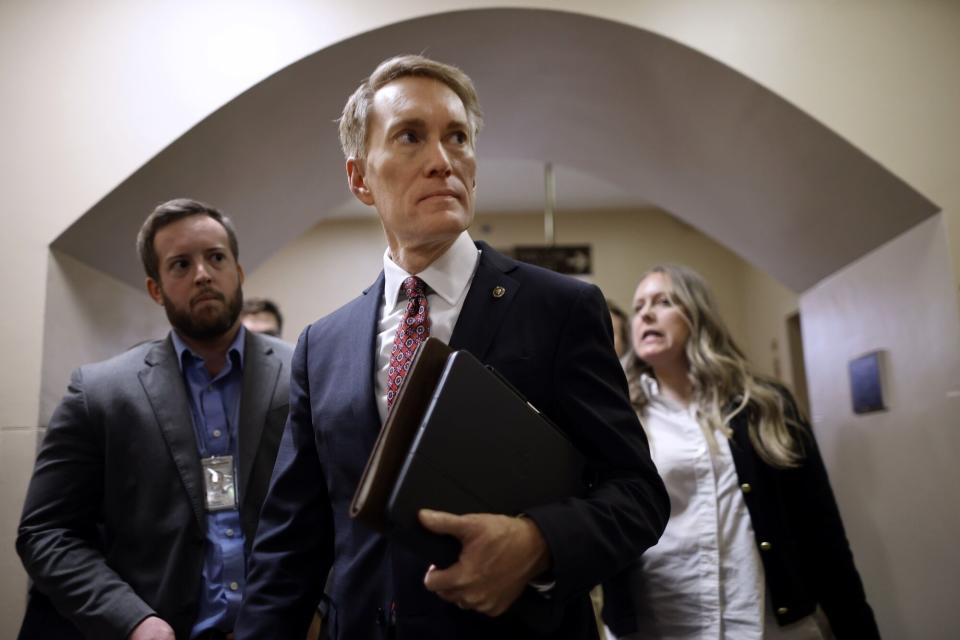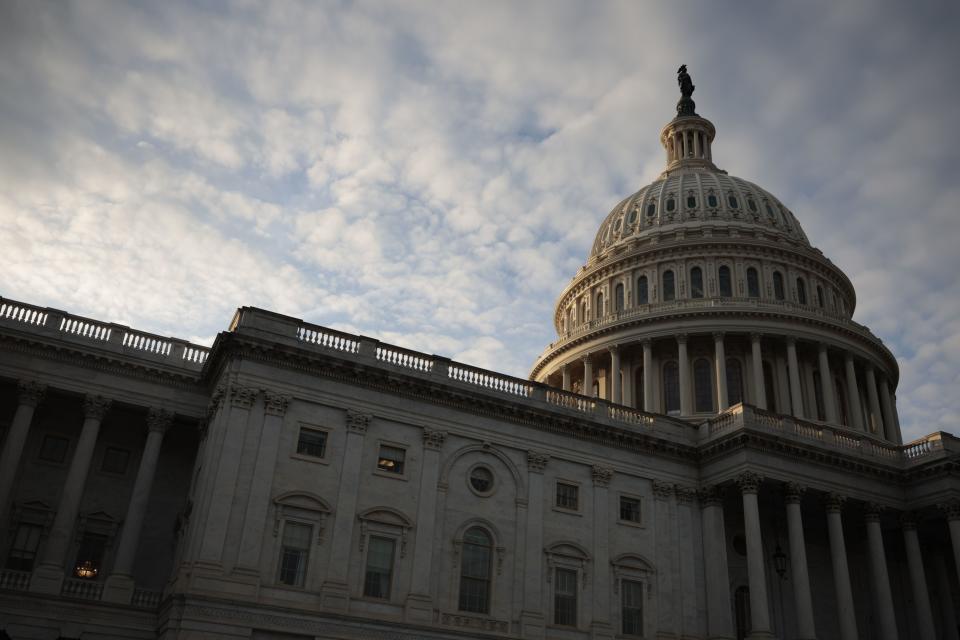Senate Vote Ends Border Deal Prospects
(Bloomberg) -- The Senate delivered a death blow to efforts to impose new border restrictions, blocking a carefully negotiated bipartisan compromise after former president Donald Trump and House Republican leaders denounced the deal.
Most Read from Bloomberg
A 99% Bond Wipeout Hands Hedge Funds a Harsh Lesson on China
Epstein Contacted Staley for Years at Barclays Using Go-Between, Court Filings Claim
Citadel Among Hedge Funds That Got Morgan Stanley’s Block-Trading Leaks
Xi’s Markets Shakeup Surprised Insiders, Showing Alarm Over Rout
The 49 to 50 Senate vote Wednesday virtually guarantees Congress won’t pass any broad immigration or border legislation before the November presidential election, and perhaps much longer than that. Under the chamber’s rules, 60 votes are needed to break a blockade against legislation.
It also leaves no clear path for new US military assistance to Ukraine, Israel and Taiwan.
The emergency aid was included in the border deal blocked Wednesday. While Senate Democratic leaders plan to try to pass the aid package without the border enforcement agreement, that approach faces daunting prospects in the House, where Republican leaders insist migration policy be addressed first.
The Senate on Wednesday night put off a vote on a measure that would provide assistance to Ukraine, Israel and Taiwan. “We will recess until tomorrow and give our Republican colleagues the night to figure themselves out,” said Majority Leader Chuck Schumer.
Read More: Schumer Optimistic Ukraine Aid Will Pass Senate Without Border
Abandonment of the border deal shifts the issue to the presidential contest between President Joe Biden and Trump, the Republican front-runner. A tough stance on immigration enforcement has been central to Trump’s political identity throughout his electoral career, and he is again making it a pillar of his presidential campaign.
Six in 10 swing-state voters say the president bears responsibility for a surge in migration across the southwest border, a Bloomberg News/Morning Consult poll taken last month found.
Read More: Swing-State Voters Blame Biden for Migrant Surge at the Border
Biden on Tuesday attacked his rival, saying Trump and border deal opponents are now to blame for the continued migration surge.
“Every day between now and November, the American people are going to know that the only reason the border is not secure is Donald Trump and his MAGA Republican friends,” Biden said.
Republicans argue Biden’s handling of the border for three years has led to the surge.
“Make no mistake about it, this is the Biden border crisis. This was totally avoidable. When he came into office, he reversed all the policies of the previous administration and now we’re seeing the results of that,” second-ranking Senate Republican leader John Thune said.
The failure of the border compromise is political blow to Senate Republican leader Mitch McConnell, who had argued addressing the border surge is good policy for the US as well as good politics for a Congress with few substantive achievements to run on.
“I followed the instructions of my conference, who were insisting that we tackle this in October. I mean, it’s actually our side that wanted to tackle the border issue. We started it,” McConnell told reporters Tuesday, after ultraconservatives in Congress blamed him for striking a deal.
McConnell’s effort ran into a buzz-saw when Trump became the presumptive presidential nominee and demanded the Senate reject any deal that was not “perfect.” Only three Senate Republicans publicly backed the deal, including McConnell and negotiator James Lankford of Oklahoma.
The complicated border deal released Sunday night was difficult to explain and even more difficult to defend in the face or relentless attacks by Trump and his allies.
The compromise measure would crack down on illegal border crossings, make it harder to apply for asylum and speed up deportations of undocumented migrants but also open up more visas for legal immigration.
Read More: Tougher Enforcement, More Visas: Inside the Senate Border Deal
Failure on immigration was always a safe bet.
Lawmakers have struggled for years to build consensus to update decades-old US immigration laws. Bipartisan efforts to overhaul the system in 2013 and 2018 buckled under political pressure, and a Democrat-led attempt fell short on procedural grounds two years ago.
The three Senate negotiators — Lankford, Connecticut Democrat Chris Murphy and Arizona independent Kyrsten Sinema — knew they were tackling one of the most vexing areas of domestic policy when they started talks four months ago.
Lankford was still clinging to hope Tuesday that the effort could continue, but acknowledged he’s about the only lawmaker not willing to declare the deal dead. Murphy said he wants to keep working on a deal but estimated it’d take another decade to reach agreement.
“We probably just have to take no for an answer,” he said.
(Updates with vote put off, in fifth paragraph.)
Most Read from Bloomberg Businessweek
How Jack Dorsey’s Plan to Get Elon Musk to Save Twitter Went South
OpenAI's Secret Weapon Is Sam Altman's 33-Year-Old Lieutenant
©2024 Bloomberg L.P.

 Yahoo News
Yahoo News 



